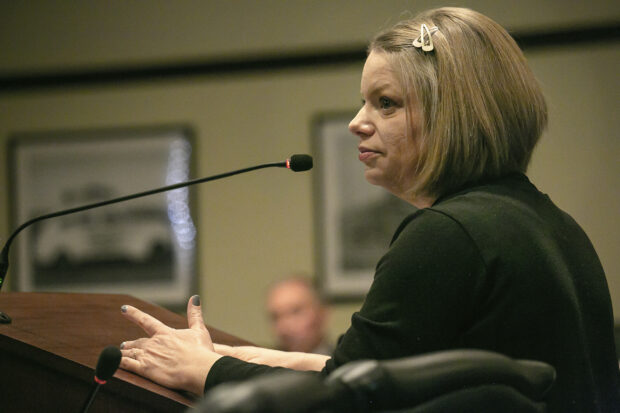Dozens of educators and parents packed the Statehouse Wednesday for a highly anticipated showdown over Common Core-aligned academic standards.
The House Education Committee accepted more than three hours of testimony but did not vote on whether to retain or reject the standards. Instead, hearings will continue into next week.
Idahoans traveled from as far as Blackfoot and Salmon, with testimony running 16-5 in favor of retaining English language arts standards.
Several educators and education stakeholders backed the standards, saying they are rigorous, build upon each other from one year to the next and help teachers design units and lesson plans. Many of them warned that schools could be thrown into disarray if the Legislature rejects the standards and has nothing to replace them with.

The standards “are the charter and foundation and anchor by which we educate students in Idaho,” said State Board of Education President Debbie Critchfield.
“What I appreciate every year is every standard is deepened a little bit,” seventh-grade teacher Julia Withers said. “The rigor of the standards, they are fantastic. I can move beyond basic comprehension.”
Under questioning, Withers told the committee she has heard no complaints from Vallivue parents over the standards.
Some parents, an Idaho Freedom Foundation official, one current and one former school board member and Madison district Superintendent Geoffrey Thomas (via a written letter) urged lawmakers to reject the standards. They argued the standards were failing Idaho students, represented a top-down, one-size-fits-all approach to education and result in inappropriate materials being placed before Idaho students.
“I can’t tell you how many calls I get from frustrated parents and kids who are falling behind. Reading comprehension isn’t what it should be,” said former Salmon school board member Kenn Roberts.
Idaho Freedom Foundation Vice President Fred Birnbaum said a decade’s worth of stagnant scores on the National Assessment of Educational Progress (the national test given every two years to a sampling of Idaho students) show the standards have failed students.
“If outcomes haven’t improved and the standards were sold on improving outcomes shouldn’t the shoe be on other foot?” Birnbaum said, saying supporters should have to bear the burden of proving why the standards should be retained.

“This is not the missile coming down on Soleimani if we replace standards,” Birnbaum added, making reference to the recent U.S. attack on an Iranian major general.
Blackfoot school board member Sonya Harris said curriculum and textbook providers use Common Core to recommend “pornographic books” to use in schools. She read a passage from National Book Award finalist “Dreaming in Cuban” to support her claim.
“We feel pressure to choose curriculum companies closely aligned to Common Core that promised to help our district be more successful at the SBAC,” said Harris, referring to the Smarter Balanced Assessment Consortium test aligned to the standards.
Several supporters said some opponents appear to confuse the standards (a set of expectations that students should meet or exceed) with curriculum, textbooks and individual assignments and lessons — local decisions not mandated by the standards.
Superintendent of Public Instruction Sherri Ybarra, two State Board members and the Idaho School Boards Association urged lawmakers to keep the standards.
“(The State Board) voted unanimously to support the standards, it would not be responsible to reject them without anything to replace them with,” Critchfield told legislators.
Ybarra told lawmakers the English and math standards are scheduled for a regular review and potential revision in 2021. Any recommended changes will be forwarded to the 2022 Legislature for consideration.
Wednesday’s hearing was limited to English standards. On Thursday, the committee will turn its attention to math standards, with a science standards hearing set for Monday morning.
The Legislature is taking the unusual step of reviewing thousands of pages of administrative rules this session because legislators declined to take the normal housekeeping step of reauthorizing them before the 2019 session adjourned.
Academic standards, immunization guidelines, graduation requirements and a host of other regulations take the form of administrative rule, which is why they are being reviewed this year.
If and when a vote on the standards comes down, legislators will be able to reject them either partially or entirely, or retain them. If, for example, House Education votes to repeal English standards, the Senate Education Committee would also need to reject the same standards in order to remove them from the books. If the Senate didn’t go along with the House, the standards would remain in place.
